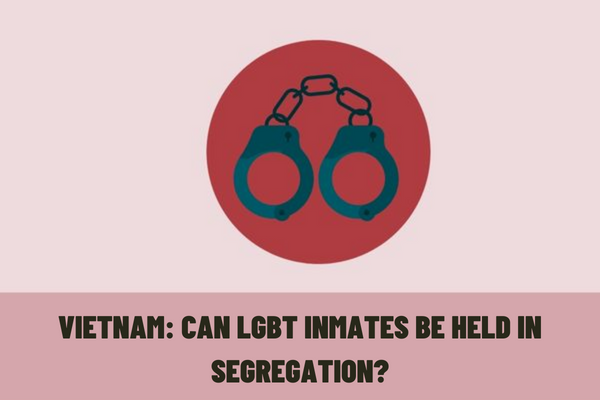Vietnam: Can LGBT inmates be held in segregation?
Can LGBT inmates in Vietnam be held in segregation?
Pursuant to Clause 3, Article 30 of the 2019 Law on Execution of Criminal Judgments in Vietnam:
Incarceration of inmates
...
3. Inmates who are LGBT or whose gender is unidentified may be held in segregation.
According to the above regulations, inmates who are LGBT or whose gender is unidentified may be held in segregation.

Vietnam: Can LGBT inmates be held in segregation?
In addition to LGBT inmates, which inmates are held separately?
Pursuant to Clause 2, Article 30 of the 2019 Law on Execution of Criminal Judgments in Vietnam, in addition to LGBT inmates, the following inmates shall be held separately:
- Female inmates;
- Inmates under 18 years of age;
- Foreign inmates;
- Inmates with infectious diseases category A as prescribed in the Law on Prevention and Treatment of Infectious Diseases;
- Inmates showing signs of mental diseases or other diseases that have deprived them of the consciousness or act control capacity pending a court decision;
- Inmates with children under 36 months of age residing with their mothers in prison;
- Inmates who repeatedly violate detention internal regulations.
What are the rights and obligations of inmates in Vietnam?
Pursuant to the provisions of Article 27 of the 2019 Law on Execution of Criminal Judgments in Vietnam stipulating the rights and obligations of inmates as follows:
Inmates have the rights to:
- Have their lives, health, assets, dignity protected and respected; having been informed of their rights and obligations and regulations of places of detention;
- Receive board and lodging, clothes, personal care, health care as prescribed; receive letters, gifts, money; read books, newspaper, listen to the radio, watch television in conformity with conditions of the place where they serve the sentence;
- Participate in physical training and sports, cultural and performance activities;
- Participate in work, study, apprenticeship activities;
- Meet and contact with relatives, representatives of agencies, organizations, and individuals; or have consular visit and contact in case of foreign inmates;
- Conduct civil transactions as per the law by themselves or via their representatives;
- Lodge complaints and denunciation; request amnesty or claim damages as per the law;
- Participate in voluntary social insurance, enjoy policies on social insurance as per the law;
- Use prayer books, express religious belief and faiths as per the law;
- Receive commendation upon their high performance during their serving time.
Inmates have the following obligations to:
- Serve the legally effective court judgment or decision, abide by decisions of criminal judgment execution management agencies, criminal judgment execution agencies during their serving time and other decisions of competent authorities;
- Abide by regulations of the place of detention, serving emulation standards;
- Abide by requests, orders and instructions of officials of places of detention;
- Work, study and learn skilled trade as prescribed;
- Pay damages if they break, lose or destroy assets of other people.
Inmates have other rights and obligations as prescribed in this Law.
What are the tasks and powers of prisons?
Pursuant to Clause 1, Article 17 of the 2019 Law on Execution of Criminal Judgments in Vietnam, the tasks and powers of prisons are as follows:
- Admitting inmates and managing the incarceration, education and rehabilitation of inmates;
- Notifying relatives of inmates of the admission of inmates and their serving of sentences;
- Requesting competent courts to consider deciding reduction of the duration of serving prison sentences, suspension of the serving of prison sentences, parole granted to inmates as per the law;
- Following inmate transfer orders of competent authorities or persons;
- Receiving personal possessions and money voluntarily handed by inmates and relatives of inmates at prisons for judgment execution, transfer them to civil judgment enforcement agencies of places in which the courts which have conducted first-instance trial of the cases are based or civil judgment enforcement agencies are delegated to enforce the judgments ; receiving personal possessions and money from civil judgment enforcement agencies and handing them to inmates under the Law on Enforcement of Civil Judgments;
- Cooperating with civil judgment enforcement agencies in providing information about places where inmates serve their prison sentences, the exercise of civil rights and performance of civil obligations of inmates, to the places of residence of persons who are granted pardon, exempted from serving prison sentences or parolees; transferring documents related to inmates sentenced to payment of fines, confiscation of property and other civil obligations;
- Issuing certificates of complete serving of prison sentence and certificates of parole;
- Carrying out procedures for handling cases of deceased inmates;
- Escorting, delivering foreign inmates under court decisions on the transfer of persons currently serving prison sentences; admitting, and managing the incarceration, education and rehabilitation of Vietnamese inmates who committed crimes and were sentenced to prison in foreign countries and have been transferred to Vietnam for serving their sentences; implementing the provisions of this Law on execution of the expulsion sentence;
- Following statistics and report regulations on execution of prison sentences;
- Performing other tasks and powers as per the law.
LawNet